Summer in Sarajevo: My Journey of Self Discovery and Meaningful Connection in a New Cultural Context
By Aashni Jain ’24
The Global Research Institute’s Summer Fellows Program provides international experiential learning opportunities to W&M students. This post is one installment of a series highlighting the 2023 Fellows’ key discoveries and formative experiences.
In the spring of 1992, an ethnic conflict broke out in Bosnia and Herzegovina. Sarajevo, a gorgeous city that had hosted the Winter Olympics just eight years earlier, became known as a place of war and tragedy. Almost 30 years later, it is important to see past the stigma and remember there is so much more to Bosnia than the conflict. Its distinct cultural identity is truly something to marvel at. However, the more people that continue to ask questions about what happened in Bosnia, the better.
Landing in Sarajevo, I was starstruck by the mountain range that seemed to go on for miles into the horizon. I left baggage claim, and as I exited the airport, I was greeted with a warm embrace and a smile. I didn’t know it then, but my time in Bosnia would be one of the most transformative experiences of my life to date.
Along with the other participants in the project, John Babbitts, Nancy O’Gara and Falan Kifle, I stayed with a host family in the mountains in Sarajevo. My host parents, Amela and Boris, had two wonderful children, Ena and Deni, who were both students in the project. From walking through Baščaršija (the old town of Sarajevo) at night to eating homemade traditional meals to watching Wimbledon to playing card games, I could not be more grateful for their kindness and acceptance. In a new country thousands of miles from home, it is rare to forge bonds that could make anywhere feel like home, and I feel so lucky to have done that with the Barisic family.
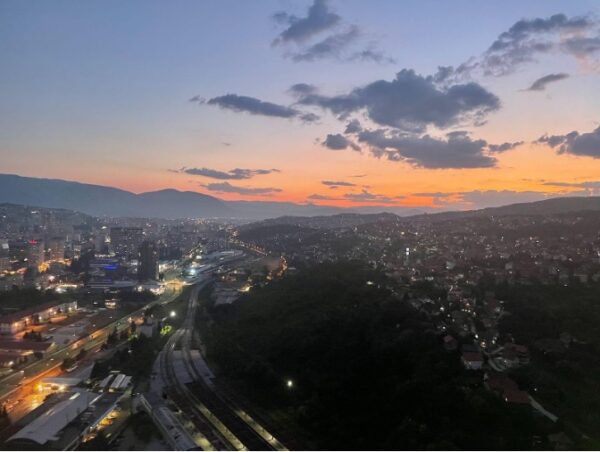
A sunset view from Avaz Twist Tower. On the right are a few residential neighborhoods (one of which we lived in!), and the rest of Sarajevo sprawls out on the left.
Before I get into my more personal takeaways, I wanted to talk about the project and the purpose of my trip. This summer, I had the amazing opportunity to be a co-teacher and researcher in Sarajevo with the American-Bosnian Collaboration Project, a research lab based at GRI that partners with the University of Sarajevo to foster cross-cultural understanding for the youth of Bosnia. The lab also receives support from William & Mary’s Charles Center and Civic & Community Engagement.
Each of the four of us from W&M were paired with a counterpart from Sarajevo with specific training or interests in teaching English. Each pair of teachers taught a different age group in English under a peace education framework — which included modules such as ecology, tolerance, nonviolent communication and diversity.
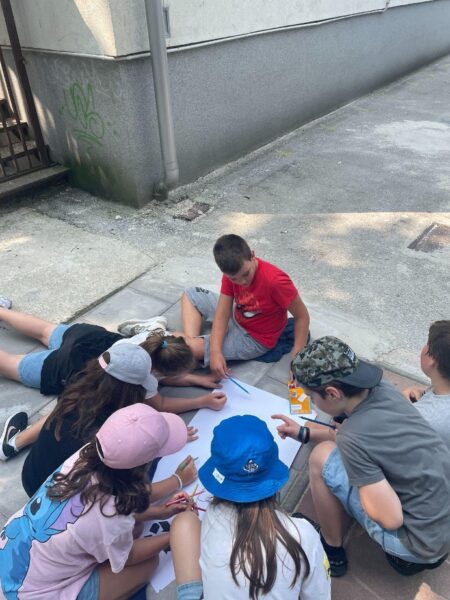
Some of our students working on a poster on day 2 to tell people why caring for the environment is important.
My incredible co-teacher, Emina Zubača, and I were assigned the youngest group of about twenty 10-year-olds, and I could not have been more thrilled by their growth throughout the project. They especially thrived through the ecology module, in which we talked about ecosystems and how interconnected the natural world is. They found it difficult to work together at times, especially when they cared about different things. However, a few words of encouragement went a long way and they were able to make organic fertilizer, make a booklet showing how to use food scraps to do it, and create a skit to go along with everything as their final project!
For the research component, we wanted to explore whether experiential learning methods related to caring for the environment would help students build intercultural competence skills. Experiential learning is about connecting new concepts to everyday life, through reflection and intentional practice. Specifically, being outdoors and engaging with the environment has been proven to facilitate collaboration and bolster self-confidence, which go hand in hand with intercultural competence.
At the beginning and end of our three-week program for the students, we collected surveys from students assessing their intercultural communication skill levels. In addition, we collected teacher reflections of their class periods each day and rubrics for grading students’ final environmentally-conscious projects. While we are still working on analyzing our data, watching my students grow was an irreplaceable experience. The ABC Project will collaborate to create a white paper featuring key results and paths forward.
Projects like ABC exist for the goal of preventing future conflicts and empowering the next generation with the tools it needs to interact with empathy. As someone who has always been interested in both peacebuilding and education, this project was a unique opportunity for me to make an impact and explore my passions at the same time. As I reflect on my experience in the project, I truly hope our students will be able to internalize the peace education framework in order to prevent history from repeating itself.
My time in Sarajevo was absolutely amazing — all thanks to the group of co-teachers and coordinators I had the opportunity to connect with. Each day after teaching, all eight of us fell into a pattern of having a long lunch to debrief how our classes went that day, get to know each other better, and just enjoy each other’s company. Often, we would then switch locations to keep it going over coffee and make plans for the weekend.
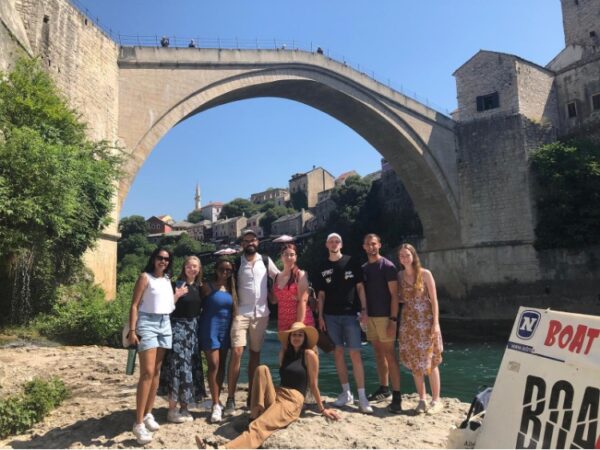
Our group of co-teachers under the famous Old Bridge in Mostar on a weekend trip.
Living slowly and stopping to genuinely smell the roses was a welcome change. Throughout college, my mindset and daily routine looks like juggling a lot, and always focusing on the next thing. My definition of success was impossible, and so were my expectations of myself. For the first week of the project, I was really worried about a lot. Was I doing enough to take advantage of the experience? Was my teaching style effective? However, as the weeks went by, spending longer periods of time with others and with myself — with zero guilt whatsoever — allowed me to be at my best when teaching. I’m eternally grateful for all the reflection time I spent with such wonderful people and for the deeper sense of self I gained during my time in Sarajevo.
Thank you to GRI for making this opportunity possible for me. And lastly, a huge thank you to everyone working with Creativus — Lejla, Marija and Merima, as well as Larisa, Aleksandra, John, Nancy, Falan, Ernad, Selma, Nermin, Emina and Professor Pickering for all the support throughout this project and beyond.

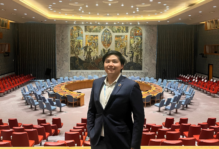
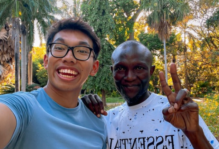
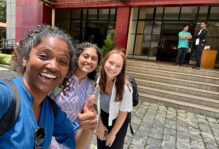
No comments.